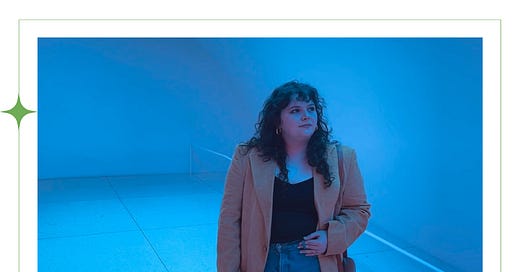Hey everyone,
I’m excited to bring you guys another installment of the On Rejection interview series. Victoria’s story of getting her Master of Fine Arts is a great one for anyone considering applying to MFA programs. She has a great perspective on it and on what it means to one’s creative life after. Enjoy!
If you’re just discovering Collected Rejections, welcome! In this world, writing is still fun, rejection is not a bad word, and we’re all here to grow as writers. If you’re into that, subscribe to this newsletter here:
Hi Victoria! Tell us about a time you experienced rejection.
I’ve wanted to be a writer for as long as I can remember, but I did not realize how much rejection is just part of the writing process. I sent out stories from my MFA thesis to 75+ journals and got lots of positive feedback but no acceptances. I finally got an acceptance for some poetry I wrote in a cross-disciplinary workshop which was really encouraging. But I think it can be really discouraging to experience that much rejection, especially when it is related to one’s creative work.
How did you get over it?
I think the huge thing is seeing rejection as an opportunity for growth. Ultimately, if a reader or editor did not like my work, it may mean it was not a good fit for a journal or it may mean that piece is not ready for publication. Either way, it gives me something to work on. As an emerging writer, I realized that I’d made some mistakes in my approach to submitting work. I definitely could have been more strategic, but I am really happy that I made those mistakes because I’ve learned so much from the process. I’ve also found so many more resources as I have gone along and feel much more well-equipped to send work out in the future.
If you could go back and tell yourself anything right before that experience, what would you say?
I read a Substack by
about only getting to debut once and focusing on the process of writing. She was talking about a first book, but I think this could apply to sending out work to journals too. If I could go back, I would tell myself to focus on writing what I love and not worry about rushing to send work out before it is ready. I think it’s really important to love writing for the sake of writing and to have fun when you’re writing. When you have something to send out, great, but I think focusing on trying to get work out there can be really exhausting and can distance you from the reason you wanted to write in the first place.You recently finished your MFA program--how did that experience improve or change your writing?
It was such a fantastic experience! I did a low-res program that started in January 2020. We had our first retreat together and got to meet face-to-face in January then went straight into lockdown. It was nice to have that community still during the pandemic as well as having something I felt like I was making progress on. I think the original system my professor had set up before the pandemic was just to have discussions on a discussion board, but my classmates and I decided to meet over Zoom to talk about the readings and to workshop each other’s work. I know not every MFA program is a safe and supportive space, so I was really lucky to have the experience where my classmates were the kindest, most supportive people who I also felt inspired by.
My writing is a million times better than it was when I went into the program. Since I got my BFA in cinematic art and only took a few creative writing classes in undergrad, I had no idea really what I was doing. Having the dedicated time and the support of people who really wanted to see me get better was life-changing for sure.
I also was able to get some perspective on rejection in my MFA program from my professors who are accomplished writers but still struggled with getting rejection letters from lit mags. In 2021, one of my professors was still waiting to hear back from a lit mag for a packet of poems he’d sent in 2014.
What are you working on now?
I am primarily a short story writer, so I am working on putting together a collection. Recently, when I have been working on new stories, I have definitely felt like a few characters and plotlines have potential to be longer works. A novel is an exciting and nerve-wracking idea to me, just because it is not something I have attempted before.
I also do film photography, so I am wanting to figure out how to incorporate my photography into my work especially as it relates to history, place, and landscape. Photography was a decompression hobby for me after grad school. I’d done a lot of photography in middle and high school but bought my first film camera the week after I graduated from my MFA program. Weirdly enough, I feel that I get inspiration for stories while I’m taking pictures, so I’d really love to use those photos in some way. My current photo project is on laundromats and their place in communities.




